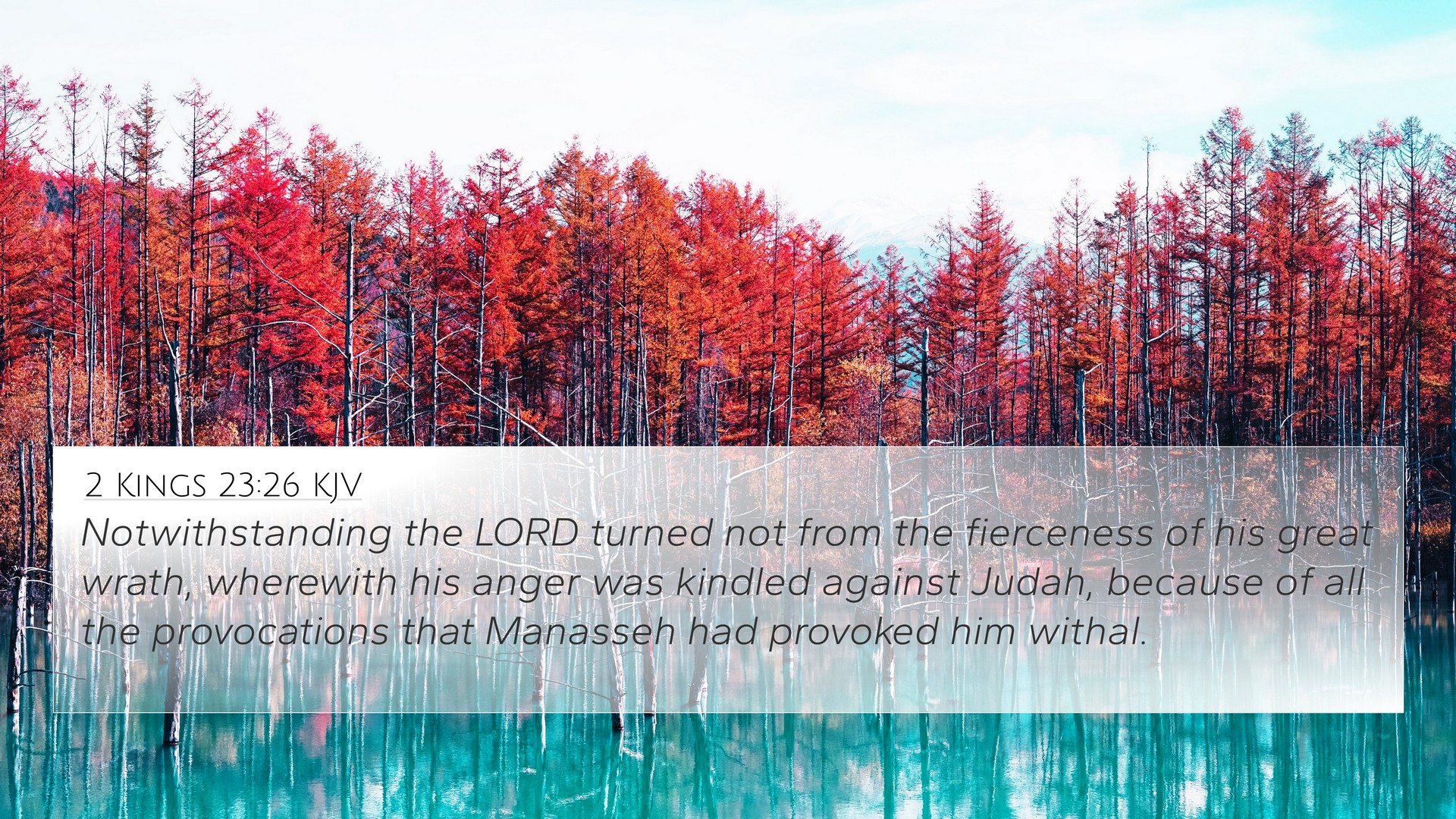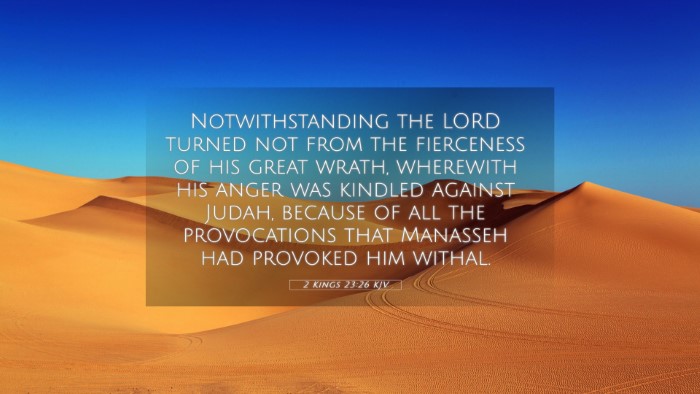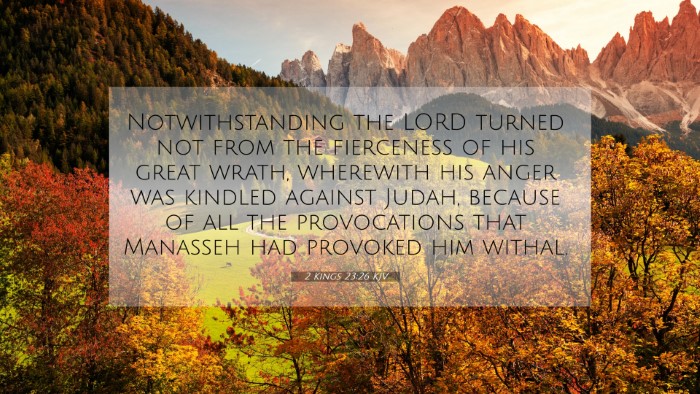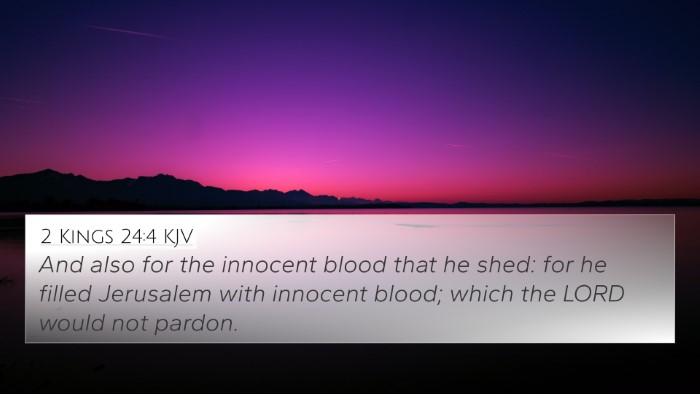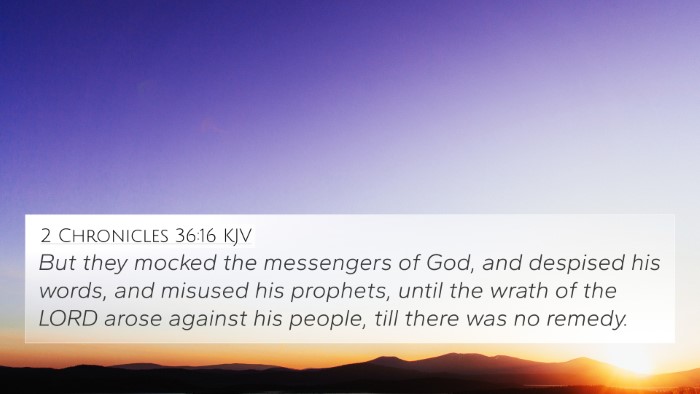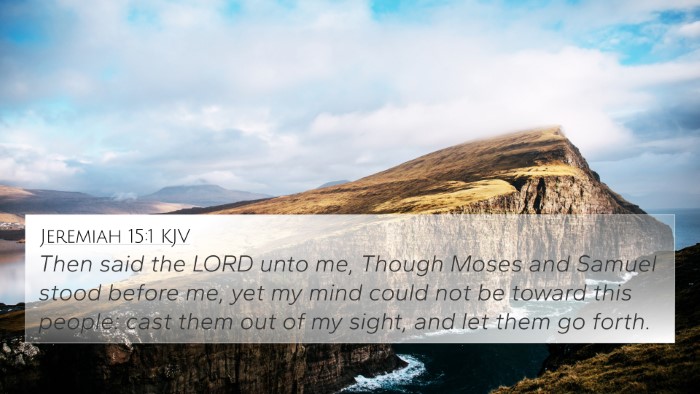Understanding 2 Kings 23:26
Bible Verse: 2 Kings 23:26
“Yet the Lord did not turn from the fierceness of his great wrath, with which his anger was aroused against Judah, because of all the provocations with which Manasseh had provoked him.”
Summary of Insights from Public Domain Commentaries
This verse, located in the historical context of Judah’s decline, highlights God's unwavering wrath against sin, particularly as provoked by Manasseh's actions. Ancient commentators including Matthew Henry, Albert Barnes, and Adam Clarke provide a multi-faceted view of this scripture.
Matthew Henry's Commentary
Key Insights:
- Henry emphasizes the prolonged nature of God's anger, illustrating a thread of divine justice throughout Israel's history.
- He notes that Manasseh’s sins, including idolatry, were particularly grievous, leading to generations of turmoil.
- The passage emphasizes the seriousness of sin and reminds us that transgressions can have lasting repercussions beyond the immediate moment.
Albert Barnes' Commentary
Key Insights:
- Barnes highlights the concept of divine retribution, suggesting that God’s anger is a response to persistent rebellion against His commandments.
- He points out that even with reforms initiated by King Josiah, the iniquity left by Manasseh was deeply entrenched.
- This verse serves as a warning about the consequences of straying from God’s laws, reinforcing that repentance may not always eliminate previous penalties.
Adam Clarke's Commentary
Key Insights:
- Clarke discusses the theological implications of God’s wrath, emphasizing that it is both just and righteous.
- He addresses the nature of holistic repentance and how superficial changes can fall short of facing the deep-seated issues created by prior sins.
- Clarke connects this verse to the broader narrative of Israel's continuous struggle with idolatry and covenant violation.
Theological Themes
This passage encapsulates several theological themes worthy of deep exploration:
- Divine Wrath: The concern for justice reflects a God who responds to human actions.
- Historical Accountability: The legacy of leadership profoundly shapes the moral fabric of a nation.
- Repentance and Its Limits: Genuine change in behavior does not always negate the consequences of past actions.
Bible Verse Cross-References
This verse can be connected to several other scriptures that amplify its themes of divine anger, sin, and national consequences:
- 2 Kings 21:11-16: Descriptions of Manasseh's sins.
- Jeremiah 15:4: A statement on the consequence of Manasseh's actions.
- 2 Chronicles 33:10-13: Manasseh’s repentance and God’s mercy.
- Leviticus 26:14-39: God's promises of blessing or punishment based on Israel's obedience or rebellion.
- Deuteronomy 29:24-28: The repercussions of turning from God.
- Lamentations 2:3: God's wrath on Judah.
- Isaiah 1:4: A nation laden with iniquity.
Connections Between Bible Verses
The connections between these verses highlight thematic Bible verse connections focusing on sin, wrath, and redemption. The implementation of tools for Bible cross-referencing can enrich understanding through comparative Bible verse analysis.
Using Bible Cross-References
For effective study, it’s beneficial to utilize a Bible cross-reference guide to identify linking scripture. Methods of cross-referencing can offer deeper insights into the nature of divine judgment as depicted across the narrative of the Old Testament and its fulfillment in the New Testament.
Application for Today
Understanding 2 Kings 23:26 calls for personal reflection on how individual actions can impact broader communities. In an era where moral choices echo those of biblical leaders, this verse encourages vigilance and accountability.
Conclusion
This analysis of 2 Kings 23:26 reveals the profound relationship between human actions and divine responses. Through the lens of biblical commentary and cross-references, readers are encouraged to explore further the nature of God’s justice, the weight of sin, and the importance of true repentance. Engaging with these themes through structural cross-references can illuminate the interconnectedness of scripture, making scriptures alive and relevant.
